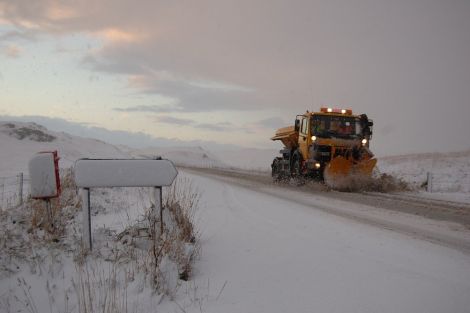News / Slight changes to gritting service following icy winter
THERE will be extra gritter provision in Shetland on weekends this winter as well as crews formally being placed on standby on Christmas and New Year’s day after concerns were raised about last year’s service.
The measures have been implemented as a stop-gap this winter while Shetland Islands Council prepares a new full gritting policy.
Three changes to the policy were approved by the council’s environment and transport committee on Tuesday.
Gritters will now be deployed for an extra hour on Saturdays and Sundays to echo weekday provision, with ‘priority three’ side roads also set to be treated in severe conditions instead of just main routes and loop roads.
Crews will also be formally placed on standby to respond to “blue light” emergencies and police call-outs after 5pm, as well on Christmas and New Year’s Day.
During these periods crews could treat priority one roads in their area, and if there have been incorrect weather forecasts and roads could do with being treated at short notice.
Asset and network team leader Neil Hutcheson said the gritters have previously been on hand to respond to emergency situations if required.
Members of the council’s environment and transport committee heard on Tuesday that the interim measures will cost a maximum of £52,000, depending on the severity of the weather.
Concerns had been expressed by locals that there is an increasing number of road users who choose to travel in the evening and on public holidays outwith the treatment times of the current policy.
Current policy is that gritting operations take place from 6am to 6pm on weekdays, except in severe conditions where they are extended to 9pm. In practice, however, this has been cut back to 4pm due to driver’s hours regulations.
At weekends, there is 7am to 5pm provision on priority one and two roads only, but that is set to shift to a 6am start and will include priority three roads in severe weather.
Become a member of Shetland News
No gritting on 25 December or 1 January will continue, but the existing response to “blue light” emergencies will be formally put into place.
Last year gritters were called out on 58 mornings compared to the average number of 30-35, which was partly due to a number of instances where rain turned to ice instantly on the road.
Councillors heard that the cost of a typical winter gritting season is about £1 million – this includes £400,000 on labour, £200,000 on materials/salt and £300,00 on plant/equipment.
If the council were to provide “24 hour” gritting cover then it would cost an extra £750,000, with problems also likely to be found in resourcing drivers.
Police records show that the number of accidents resulting in injury which may have been attributable to winter conditions amounted to six over the last three years.
Five of these took place outwith the usual 6am to 4pm gritting period.
In the past five years there has only been one gritter response to a “blue light” emergency on Christmas and New Year’s days – but the rate of police call-outs throughout the season has increased in recent years.
Environment and transport committee chairman Ryan Thomson said part of what was decided on Tuesday was to “implement in policy what the council already does” with regards to emergency cover.
“Although this is nothing new, it formalises it and puts it in policy to make sure that this service is aware to the public,” he said.
“It’s certainly a welcome move. It’s an interim measure, so it’s only going to be for the next year whilst a full and proper assessment of Shetland’s needs is met and I’m sure that will come to the environment and transport committee, and probably full council I’d imagine, in the near future.”
Become a member of Shetland News
Shetland News is asking its readers to consider paying for membership to get additional perks:
- Removal of third-party ads;
- Bookmark posts to read later;
- Exclusive curated weekly newsletter;
- Hide membership messages;
- Comments open for discussion.
If you appreciate what we do and feel strongly about impartial local journalism, then please become a member of Shetland News by either making a single payment, or setting up a monthly, quarterly or yearly subscription.





























































